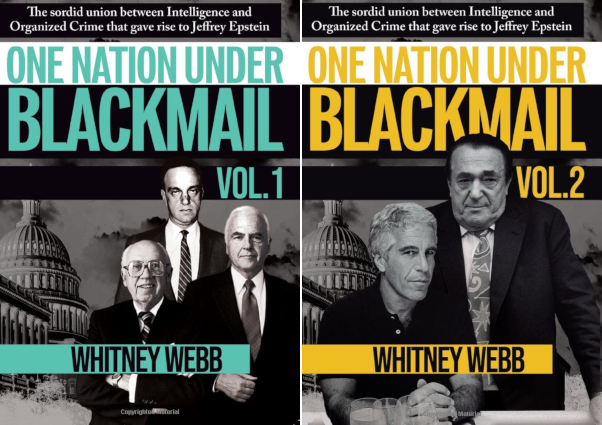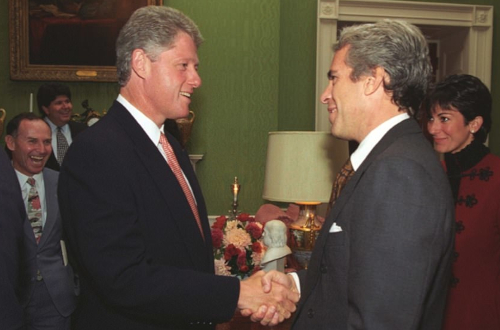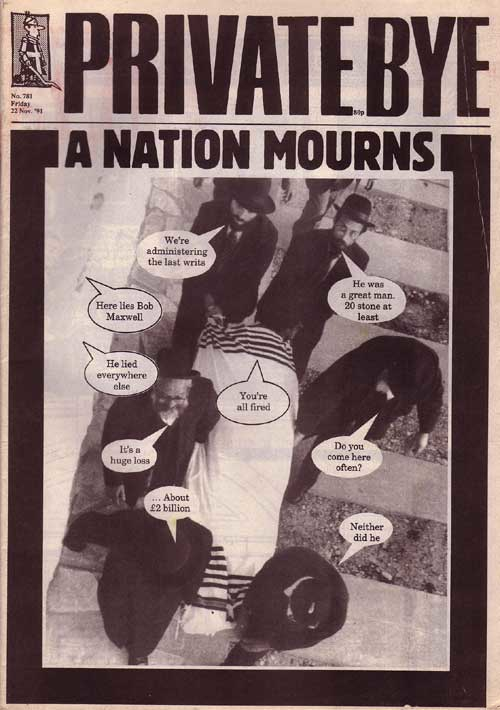
Reflections on Vancouver, British Columbia and other topics, related or not
One nation under Israel
Whitney Webb goes beyond the pale in her
compendium of blackmail, corruption and control
Greg Klein | April 5, 2023
“Blackmail” hardly does this subject justice. The theme of surveillance and control goes much further while an even stronger theme encompasses networks—incredibly wide-ranging entanglements of politics, finance, espionage, arms trafficking, drug trafficking and human trafficking. The MSM missed one hell of a lot in its Jeffrey Epstein/Ghislaine Maxwell coverage. Whitney Webb reveals a much broader story not only about the infamous duo but the wider world that they represent.
She does so through an enormous amount of detail. It’s grimly fascinating yet often overwhelming and sometimes frustrating for its lack of a steadily progressing account. But attempting a step-by-step narrative of all that interwoven corruption would be like trying to represent a writhing snakepit in a neat-and-tidy flowchart.
Webb gets her material mostly from secondary and tertiary sources that have largely been ignored, brushed off, downplayed or otherwise neglected. As a strong reporter, she distinguishes between substantiated info, allegations and speculation. Her achievement—and it’s a major accomplishment that makes these two volumes a vitally important work—is to compile all that detail and connect the blots.
She starts with the WWII alignment of American military intelligence with Italian gangsters that encouraged seemingly boundless expansion. By that time, Webb relates, mob alliances had closed the gap between Italian and Jewish criminals. Even more than previously, distinctions also loosened between “legitimate” authority and criminal power.
Blackmail’s best-known American target was probably FBI boss J. Edgar Hoover, but the tactic’s success reached much further. The career of Roy Cohn, a protege of mob-linked sexual blackmailer Lewis Rosenstiel, shows the connections between business, politics and organized crime, with sexual blackmail critical to Cohn’s ability “to successfully navigate those murky, grey areas between the legal and the illegal.” By the 1950s “blackmail, particularly sexual blackmail, had become a major, even if largely invisible, force in American politics.”
Armand Hammer collected financial data from more than 100 U.S. senators and congressmen “with blackmail in mind.” Blackmailing plots connected Cohn and Epstein with Robert Keith Gray and Adnan Khashoggi, just a few of the notorious characters who found the tactic useful. Of course espionage agencies did too, like those of the U.S., Britain, Russia and Israel.
Jeffrey Epstein on one of his many White House visits,
this time at a publicized event and with an adult female.
Far more international in scope than the MSM let on, the Epstein/Maxwell grooming and trafficking enterprise extended to Eastern Europe, Asia and South America, Webb writes. Compromised politicians, public figures and scientists provided targets of foreign influence as well as sources for state secrets and sensitive technology. Several witnesses accused Republican insider Larry King, the 1980s Franklin banking scandal mastermind who diverted depositors’ money to Nicaraguan Contras and himself, of running an interstate pedophile ring with victims including foster home children. Among other Contra figures procuring young men and children were Bruce Ritter and Craig Spence. Spence reportedly bragged of his CIA connections but expressed fears that the agency would kill him and pass it off as suicide. His death was ruled suicide.
The Bank of Credit and Commerce International actually purchased children from desperately poor Pakistani families, then trained and groomed them for princes and other VIPs in the United Arab Emirates. A serial offender in many ways, the BCCI transferred, hid and laundered money for a global clientele of elite scumbags.
Essential to the international drug trade—which is central to the global economic system, Webb says—the BCCI and similar banks also allow state agencies like the CIA and Mossad to shift money between drug and weapons deals as well as other covert ops. American government complicity in the drug trade dates at least to the early 1950s, Webb points out. She quotes Catherine Austin Fitts and Chris Sanders, who see a correlation between peaks in stock market performance and drug trade activity.
This is a wide-ranging and complex book but an alternative title might have been One Nation Under Israel. Such is Webb’s unacknowledged theme of Jewish exceptionalism. There isn’t an anti-Semitic sentiment expressed here but the work often seems like a two-volume catalogue of thoroughly corrupt Jewish influence.
The names can seem innumerable but here are some examples.
There’s Meyer Lansky, the most enduring mobster of the American gangland era, “something of a visionary” who climbed from labour union and bootlegging sleaze to working with American military intelligence and introducing gangs to casinos. Maybe most importantly he built a complex criminal banking network but, incidentally, he also helped fund and arm the Haganah army fighting Arabs to create Israel.
Sleazy money was integral to the Zionist war, as Webb recounts in chapter three, Organized Crime and the State of Israel.
Pre- and post-1948, the connections are vast. Just a few more examples include Israeli Prime Minister Shimon Peres, who held close links to gangsters and Robert Maxwell. Former Israeli PM Ehud Barak, a repeat visitor to Epstein’s and other pedophile resorts, recruited Epstein’s financial wizardry to fund Carbyne911, a tech company linked to Israeli intelligence. Max Fisher, an oil and real estate tycoon, ardent Zionist and influential presidential adviser associated with mobsters and spies. His protege Leslie Wexner used tainted billions to help engineer Jewish identity and leadership.
Webb relates the powerful Russian-Jewish and German-Jewish banking families competing in the U.S.; the French and British branches of the Rothschild family who were “determined to rectify their mistake” and extend their empire to the U.S.; Robert Maxwell getting support from the Rothschilds, as well as from the Lehman banking family, Salomon Brothers and Goldman Sachs; Epstein and Ghislaine Maxwell targeting American Democrats on behalf of Israeli intelligence; Mossad tapping Bill Clinton’s White House phones; Washington’s “worst-kept secret” that the U.S. invaded Iraq at Israel’s behest; presidential insider Robert Rubin signing off on the first of Epstein’s 17 White House visits, each with a woman or girl in tow; supposed suicide case Vince Foster accused of facilitating Hillary Clinton’s alleged sale of U.S. nuclear strike codes and attack strategies to Israel; Israel pressuring Bill Clinton to pardon Jonathan Pollard after his conviction for passing U.S. secrets to Israel; Ron Perelman, caught but not charged for passing U.S. secrets to Israel; “infamous commodity trader (and Mossad asset)” Marc Rich, pardoned by Bill Clinton under pressure from Israel; let’s not forget Canada’s Bronfman family; and the list goes on.
And on and on, with Ghislaine’s daddy among those deserving special attention.
The Robert Maxwell scandals were already surfacing by the
time of the Ukrainian-born British citizen’s Israeli state funeral.
Robert Maxwell, né Jan Ludvik Hyman Binyamin Hoch, quickly placed himself among high-level European academics, businessmen, politicians and criminals after WWII. As Webb states, Israel and the USSR courted him as an espionage agent, as did Britain until MI6 concluded he was a Zionist loyal only to Israel. That country formally recruited him to work against the U.S. in the early 1960s, prior to his 1964 election as a British Labour MP.
Even before the collapse of communism his companies helped Russian oligarchs-in-making prepare their pillage of Soviet assets. Building on his Eastern European contacts and backed by Mossad, Maxwell extended a criminal business network that linked Russian, Chinese, Japanese and South American gangs, syndicates and cartels more closely than ever before, creating for the first time, as one FBI source said, “a true coalition of global criminals.”
Maxwell’s international technology sales included the tampered PROMIS software that allowed Mossad to eavesdrop on governments, businesses, financial institutions and scientific projects.
Mossad’s version of PROMIS helped propel sophisticated techniques of gathering sensitive information to control people and events. Epstein followed his mentor in this too, founding a company to provide consulting services based on a searchable database that combined personal financial and genetic info. The company, Southern Trust, reportedly helped Epstein’s $200-million rebound after his first sex crime conviction and the 2008 financial crisis.
Webb concludes with a warning about ever more sophisticated data-mining and surveillance, on a mass scale and coupled with AI analytics and social credit enforcement. Offering incomparably more efficient means of control, technology can render sexual blackmail obsolete. Everyone’s a target now and we need not harbour any special proclivities.
As for Webb, what’s next? Maybe nothing, if she suddenly dies in a bizarre accident or supposed suicide, like so many of the people she wrote about.
But those who find this 900-page work an intimidating read might try waiting for an AIPAC/B’nai B’rith/Mossad-approved bowdlerization. That could reduce the length by at least 80%.


